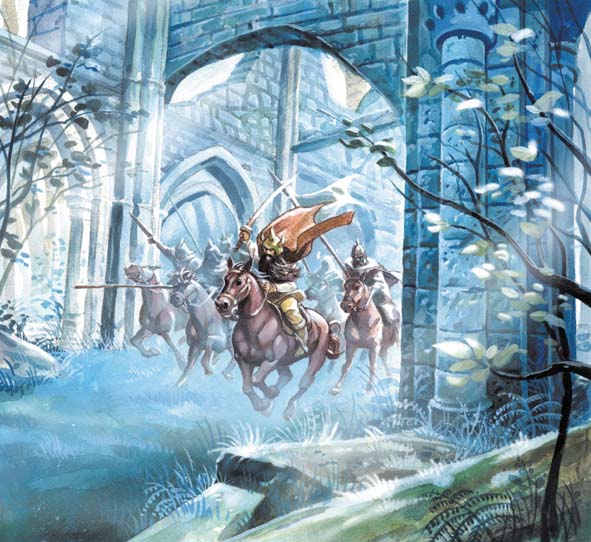
To start as a knight, sons of nobleman became pages between the ages of six to eight. The fathers send their sons to a neighbouring castle to be trained by another lord. That lord then teaches the boy how to ride a horse, hunt, hawk, and to be quick, graceful and flexible. The page would also have sword practice, lance practice, and wrestling to strengthen their body. The lady of the castle would teach the page manners, how o behave in the kings court, to sing and to dance. Though it is not common, some pages learnt to read, to write, Latin, French and many civilised topics. Pages would also receive religious training from the chaplain. The lord would teach the page how to look after equipment, such as rolling armour in sand to get rid of the rust. Sometimes they would also receive training-in-arms from squires.
Between the ages of 14 to 16, pages become squires. They have many more
 duties. Some include dressing the knight, serving the knights meals, caring for the knights’ horse and cleaning their weapons and armour. Squires also have to bring replacement weapons for the knight in battle. They also get to train with real weapons against real knights. They are also taught not to kill knights, but to ransom them. Squires are allowed to carry a sword and shield. At the age of 20, it was possible for squires to become knights. But they had to learn how to handle a sword and lance while wearing, approximately, 40 pounds of armour and riding a horse at the same time.
duties. Some include dressing the knight, serving the knights meals, caring for the knights’ horse and cleaning their weapons and armour. Squires also have to bring replacement weapons for the knight in battle. They also get to train with real weapons against real knights. They are also taught not to kill knights, but to ransom them. Squires are allowed to carry a sword and shield. At the age of 20, it was possible for squires to become knights. But they had to learn how to handle a sword and lance while wearing, approximately, 40 pounds of armour and riding a horse at the same time. As squires were usually 20 years of age before becoming a knight, their lord has to agree with the dubbing
 ceremony. They had to wear a white tunic and red robes at the ceremony. Then they had to fast and pray all night, the chaplain would bless the future knight’s sword. For the future knight, he had to bathe to show that he was pure and the priest would hear his confession. Before the actual ceremony, they had to eat a little breakfast; then the dubbing ceremony would begin. The lord would tap the squire lightly on the shoulders, while saying, “I dub thee Sir Knight.” There would be a great feast after the ceremony finished. But earlier in the Middle Ages, the person dubbing would hit the squire forcefully, knocking him over.
ceremony. They had to wear a white tunic and red robes at the ceremony. Then they had to fast and pray all night, the chaplain would bless the future knight’s sword. For the future knight, he had to bathe to show that he was pure and the priest would hear his confession. Before the actual ceremony, they had to eat a little breakfast; then the dubbing ceremony would begin. The lord would tap the squire lightly on the shoulders, while saying, “I dub thee Sir Knight.” There would be a great feast after the ceremony finished. But earlier in the Middle Ages, the person dubbing would hit the squire forcefully, knocking him over.
.jpg)
The work is very versatile, with so many concentrations intermingling,
ReplyDeleteSwords